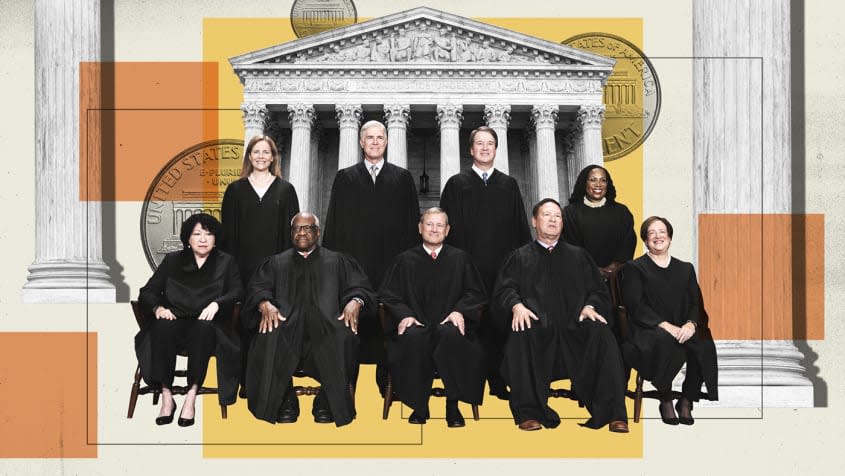Does the Supreme Court need a code of ethics?

- Oops!Something went wrong.Please try again later.
- Oops!Something went wrong.Please try again later.
Is it time for the U.S. Supreme Court to have its own code of ethics? Some Senate Democrats think so, CNN reports. Democrats want the court's funding to be tied to new requirements that justices "adopt more transparent processes for recusals and for investigating ethics allegations."
NPR reports the push "follows an increasing drumbeat of criticism aimed at the court for perceived ethical lapses and failures to deal with them." Outside groups like the Project on Government Oversight and Lawyers defending American democracy have come up with a "model code of conduct" for the court. Such a code, NPR notes, might've kept Justice Clarence Thomas from participating in a case involving the Jan. 6 Capitol riot: Critics say he should have recused himself from the matter — Thomas arguably had a conflict of interest because of efforts by his wife, Ginni, to overturn the 2020 presidential election.
The American Bar Association has also called on the court to adopt an ethics code, Bloomberg Law reports, prompted in part by the Supreme Court's declining ratings following the overturn of Roe v. Wade. "If the legitimacy of the Court is diminished, the legitimacy of all our courts and our entire judicial system is imperiled," the ABA said. But it's not clear that justices will go along with those calls, or if Senate Democrats have enough muscle to turn their proposal into law.
What are the commentators saying?
The Supreme Court exists in an "ethical no man's land," Ed Pilkington writes at The Guardian: Justices are under "no obligation to abide by a formal ethics code." That has led to scandals — like Thomas' involvement in the Jan. 6 case — and questions about other possible conflicts of interest: Watchdog groups have discovered "litany of private plane rides, dinners and gifts, attendance at politically partisan events, and inconsistencies in financial disclosures" by the justices. The late Justice Antonin Scalia, for example, often came under scrutiny about who paid for his frequent hunting trips.
That's a problem, Alan Neff and Caroline Frederickson write at Just Security: "Erosion of confidence in the Court might spread contagiously, impairing public support for, and obedience to, decisions of lower federal courts and state courts." That's why justices should agree to subject themselves to the same code of conduct that governs federal judges in the lower courts. And they should do it before Congress forces them to. "For the court's reputation and rule of law values, the justices should prefer to put their own house in order, rather than have it done for them."
But an ethics code won't fix the Supreme Court's legitimacy crisis, Noah Feldman writes at Bloomberg, if only because the justices would end up enforcing it themselves. The result is that a code "might encourage politicized harassment of the justices without truly subjecting them to any real source of external authority." The court's declining approval rating isn't a result of judges taking plane rides — it's a result of a massive shift to the right. "Only sound, careful interpretation of the Constitution can reverse the slide caused by the current court's reactionary overreach."
What's next?
The Supreme Court isn't entirely free of rules. The Washington Post reports that new regulations "quietly adopted this month" now require all federal judges — including the justices — to "provide a fuller public accounting of free trips, meals and other gifts they accept from corporations or other organizations." The new rules are less stringent than similar reporting requirements faced by Congress — but Sen. Sheldon Whitehouse (D-R.I.) said they represent a "little, but real victory" for critics seeking to raise the court's ethical requirements.
Further progress might also have to be achieved incrementally, Raymond J. McKoski writes at The Hill. "That is partly because sticky, contentious questions persist concerning which rules governing lower court judges are appropriate for members of the Supreme Court." Those questions include debates about whether justices should receive awards, accept book deals, or speak at fundraisers for charitable groups. A piece-by-piece approach to ethics reforms might be easier to push than a broader, more sweeping effort. "It is time to take the first step in enacting a Supreme Court code of ethics."
The court might indeed choose to adopt some version of an ethics code rather than wait for it to be imposed, The New York Times reports. The topic "remains a subject of study and consideration at the court." But there are reasons to be skeptical: Justice Elena Kagan in 2019 told Congress a code might be on the way. "That has pros and cons, I'm sure," she said. "But it's something that is being thought very seriously about." Four years later, it still hasn't materialized.
You may also like
Lizzo joins the Star Wars franchise and hangs out with Baby Yoda on The Mandalorian
How to see Wednesday's 'pink moon'
Why the Little Mermaid remake tweaked the lyrics to 2 of the original's songs

